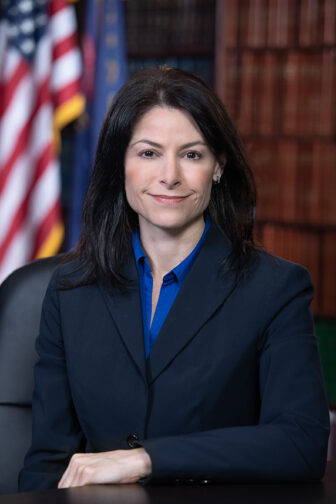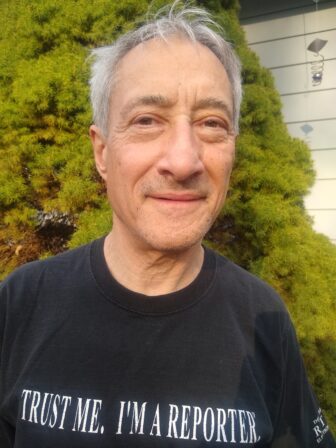By ERIC FREEDMAN
Capital News Service
LANSING — “There’s no job out there, no career, that could be more important. At no time in your life will your work be more important”
— Attorney General Dana Nessel talking with Capital News Service correspondents about the role of journalists.
After four years of bitter verbal abuse, baseless attacks and threats from the highest officials in the United States, it is reassuring to hear a ringing recognition of the critical role the news media play in our country.
That’s a lesson rooted in the First Amendment promise of press freedom and taught to us in high school civics and U.S. history classes.
Sadly and dangerously, some Americans have forgotten that lesson or choose deliberately to ignore it.
When I was growing up, my father, a roofer, brought the Boston Globe home after work for the family to read and we subscribed to the local weekly paper.

State of Michigan.
Attorney Gen. Dana Nessel.When Nessel was growing up, her family got the Detroit Free Press and Wall Street Journal, read the Observer & Eccentric community paper and watched local and national news on television with such reputable network journalists as Dan Rather, Tom Brokaw and Peter Jennings.
“Those were your news sources,” she said. “Now it seems like a million years ago.”
Today there are “millions of places to get our news,” she said, many of them “demonstrably factually inaccurate” blogs, podcasts and cable stations. “It appalls me. They have to know what is not true.”
Referring to supporters of then-President Donald Trump with unfounded claims of widespread voter fraud in Michigan after the 2020 election, she said it’s worse when it comes to undermining the election system, “our underpinning of democracy.”
In one such case, former Trump lawyer Sidney Powell filed a conspiracy-laden suit alleging fraud in “Edison County,” Michigan. Sorry, Powell. Michigan has no Edison County.
“It was the journalists who pushed back,” Nessel said. “It was journalistic integrity that finally won the day.”
The United States ranks only 45th — just ahead of Papua New Guinea — among 179 countries in the 2020 World Press Freedom Index compiled by Reporters without Borders, an international press freedom advocacy group
Even with the change in presidential administrations, American journalists still face barriers as they do their jobs. Witness the difficulties they experienced in March when they weren’t allowed to cover encounters between U.S. Customs & Border Protection agents and migrants at the Mexican border.
In protest, the Committee to Protect Journalists, another press rights defender group, issued a strongly worded statement asking the Department of Homeland Security to give journalists access to detention facilities and border patrol activities.
“The Biden administration promised greater transparency—including on the issue of immigration,” the statement said. “It’s time for officials to live up to those promises.”
And as we’ve seen, American journalists are sometimes targeted for violence simply for doing their job in pursuing fair, balanced and accurate reporting.
A vivid illustration came during the Jan. 6 violent invasion of the U.S. Capitol, where members of the mob physically attacked journalists and smashed their equipment.
Among the incidents: an Associated Press photographer was pulled down the steps, hit, shoved and threatened with death, and three protestors threatened to shoot a freelance photojournalist for the Washington Post.
“Individuals who threatened and assaulted journalists must be held accountable for their actions,” Committee to Protect Journalists program director, Carlos Martinez de la Serna, said.

Mary Ann Sipher
Capital News Service director Eric Freedman.“For the past four years, the Trump administration has lobbed attacks against individual and institutional news media. As the world has now witnessed, this rhetoric is not just a political diversion — it can embolden mobs to attack reporters who are simply trying to do their job of keeping the public informed,” he said.
Attacks on journalists – physical, psychological and economic – are tragically too common in much of the world, including the authoritarian post-Soviet countries where I’ve been training journalists, lecturing to journalism students and researching constraints on press freedom for almost two decades.
But to have it happen here in the United States is shameful, shameful, shameful.
Eric Freedman is the director of Capital News Service and a journalism professor at Michigan State University.